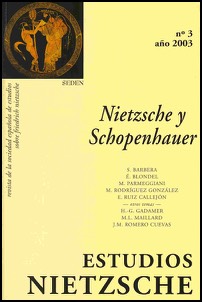Del cuerpo al mundo. Una línea de continuidad de Schopenhauer a Nietzsche
DOI:
https://doi.org/10.24310/EstudiosNIETen.vi3.9110Abstract
El trabajo parte del examen del papel importantísimo que juega la noción de cuerpo en el sistema voluntarista de Schopenhauer, en particular la ‘experiencia del cuerpo’ como lo que va a permitir satisfacer nuestra necesidad metafísica al sacarnos del mundo como representación y llevarnos al mundo como voluntad. Posteriormente, se pasará a defender que el cuerpo juega un papel muy similar en la construcción posmetafísica de la voluntad de poder nietzscheana. Se complementa la tesis central del artículo con un comentario del tratamiento que los dos filósofos hacen del problema de la relación de la mente y el cuerpo.
Downloads
Metrics
References
Barrios, M. 1993: Voluntad de lo trágico: el concepto nietzscheano de voluntad a partir de «El nacimiento de la tragedia», Editorial A. Er, revista de filosofía, Sevilla.
Fox, M. 1980: «Schopenhauer on Death, Suicide and Self-Renunciation», en M. Fox (ed), Schopenhauer. His Philosophical Achievement, The Harvester Press, Brighton/ Barnes & Noble, New Jersey, pp. 147-160.
Heidegger, M. 2000: Nietzsche, 2 vols., tr. J.L. Vermal, Destino, Barcelona.
Mandelbaum, M. 1980: «The Physiological Orientation of Schopenhauer’s Epistemology», en M. Fox (ed), op. cit., pp. 50-67.
Nehamas, A. 1985: Nietzsche. Life as Literature, Harvard University Press.
Philonenko, A. 1989: Schopenhauer. Una filosofía de la tragedia, tr. G. Muñoz Alonso, Anthropos, Barcelona.
Schopenhauer, A. 2000: Crítica de la Filosofía Kantiana, ed. P. López de Santamaría, Trotta, Madrid.
Sheeks, W. 1980: «Schopenhauer’s Solution of the Intellect-Will Problem», en M. Fox, (ed), op. cit., pp. 68-77.
Sloterdijk, P. 2000: El pensador en escena. El materialismo de Nietzsche, tr. G. Cano, Pre-Textos, Valencia.
Downloads
Published
How to Cite
Issue
Section
License
As of issue 21 (2021) this journal is published only in open access (diamond route).
From that number 21, like the previous numbers published in NIETZSCHE STUDIES, they are subject to the Creative Commons Acknowledgment-NoComercia-ShareIgual 4.0 license, the full text of which can be consulted at <http://creativecommons.org/licenses/by-nc-sa/4.0 >
It is the responsibility of the authors to obtain the necessary permissions of the images that are subject to copyright.
This work is licensed under a Creative Commons Attribution-NonCommercial-ShareAlike 4.0 International License.
Copyright generates two different rights: moral rights and patrimonial rights that EJFB recognizes and respects. Moral rights are those relating to the recognition of the authorship. They are rights of a personal nature that are perpetual, inalienable, unseizable and imprescriptible as consequence of the indivisible union of the author and his/her work.
Patrimonial rights are those that can be derived from the reproduction, distribution, adaptation or communication of the work, among others.







11.png)
